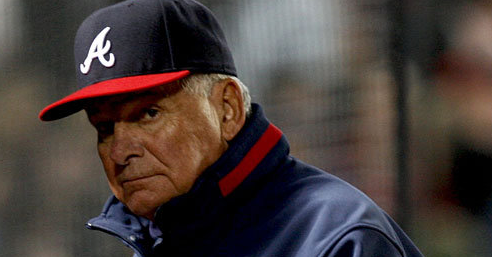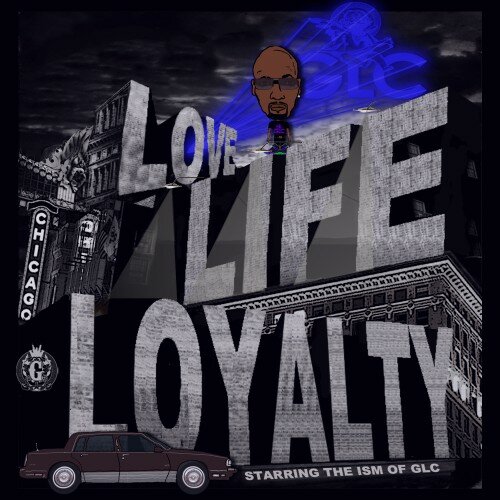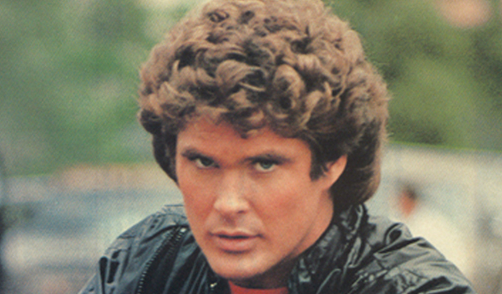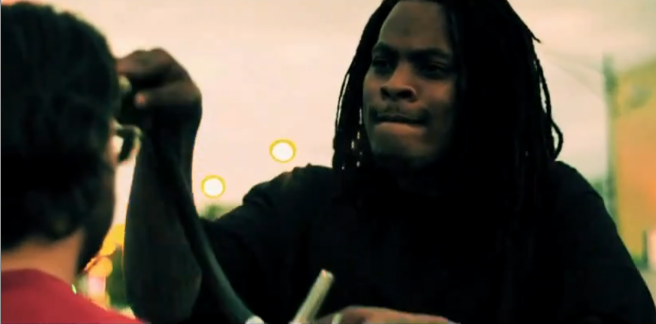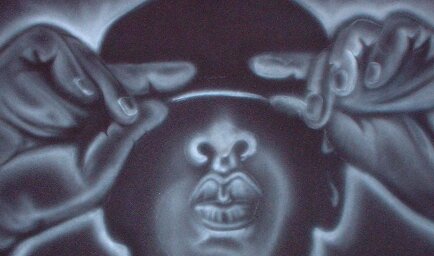
Earlier in the week, we got a tracklist for Jay-Z’s The Hits Collection: Volume One. The song selection leans heavily on his post-Blueprint work and is pretty kind to his post-”retirement” work as well. There are three songs from Blueprint 3 on this thing, which just seems weird. Revisionist history is important for Jay because presumably, wants to keep making music and so, he’s gotta lean on the recent stuff or risk a default confession that his recent stuff doesn’t match-up to the old stuff. And if that’s the case, well why is anybody going to buy the next Jay-Z album?
That said, Jay-Z’s revisionism is a bit more loaded than others’ and not quite as nefarious. Or maybe, not entirely nefarious. What’s so interesting about the guy and frankly, really brave, is that he hasn’t been afraid to change and basically “grow-up.” As a result, a lot of that older stuff is probably embarrassing for him. It also isn’t quite as appealing to the people whose circles he runs in these days. These two things tie together of course. Notice, the songs where Jay-Z is a total shitbag are missing. “Big Pimpin” is on there because that song’s reached a level of ubiquity that renders its problematic-ness beside the point. Your grandmother probably makes “pimpin” jokes.
Also: Nothing from Unplugged?
Also: How about an all The Neptunes volume?
Also: And then, an all Kanye volume please?
Back to the tracklist. Note the dearth of tracks from Kingdom Come and American Gangster, which are not only Jay-Z’s worst albums, but the albums between his Black Album “retirement” and his actually mature Blueprint 3. He grabbed the big hit off each and kept it moving. Those albums were necessary at the time, both artistically (he had to make “grown up” albums to get to the just plain grown up Blueprint 3) and financially (it was good for him to make hedged, just alright albums after retiring and nothing polarizing).
The most interesting aspect of this tracklist however, is the inclusion of The Black Album’s “Public Service Announcement (Interlude)” and “Encore.” Neither of these were singles (though “Encore” was the B-Side to “Dirt Off Your Shoulder), but they became “hits” because they were slowly championed by a fairly intense hip-hop fan base and they took on a new context via Jay-Z’s live performances. “Public Service Announcement (Interlude)” was a tone-changing, mid-performance explosion of energy and “Encore” is an ideal to track to well, use for an encore. Though “Encore” is bizarrely stuck between “03′ Bonnie & Clyde” and “I Just Wanna Love You (Give It 2 Me)” on The Hits Collection: Volume 1, “Public Service Announcement (Interlude)” is exactly where it should be and should’ve been all along: At the start of an album!
Since The Black Album dropped, it’s bothered me that “Public Service Announcement (Interlude)” is placed towards the end and The Black Album kicks off with the pretty limp “Interlude.” It also baffled me as to why “Encore” didn’t um, end the album?! With the The Hits Collection: Volume 1 at least kinda putting things back in their cosmic order, I thought it would be a good excuse to go back to The Black Album and “fix” it.
Because no one ever thought to remix Jay-Z’s The Black Album, right?
1. “Public Service Announcement”
2. “December 4th”
3. “Lucifer”
4. “What More Can I Say?”
5. “Ignorant Shit”
6. “Threat”
7. “99 Problems”
8. “Dirt Off Your Shoulder”
9. “Moment Of Clarity”
10. “Allure”
11. “Interlude”
12. “My 1st Song”
13. “Encore”
Removed:
-”Change Clothes”
“Hits”-wise, Jay-Z’s career is pretty curious because the guy never had a #1 hit before “Empire State Of Mind.” His special talent was picking songs that were pop but never too pop, that still satisfied the rap crowd, and slowly but surely wormed their way into the ears of regular-ass people who probably didn’t consider themselves hip-hop fans. That’s a cynical description, but that’s a pretty unprecedented talent and it shouldn’t dismissed or underrated. “Change Clothes” sounds like it’s trying too hard to be that pop hit. The Black Album doesn’t need this track and it never really fit anyway. It seems like it’s really on there for its hit potential and because, it would look bad for Jay-Z and The Neptunes if their only pairing was the awesome, but very understated “Allure.”
-”Justify My Thug”
Yeah, it’s a Quik beat and it’s pretty sick. In fact, it has that should-be-a-bad-idea but totally works feeling of some of Quik’s solo work. Does it work on a Jay-Z album, though? Not so much. Unless of course, Madonna showed up and sang that flip on her own hook–as was rumored–but she didn’t. The rapping also gets lost in this oozing, actually funky beat, and Jay sounds out of breath, almost like he’s shouting. There’s some fun rap nerd history hanging out around the track–Madonna sampled Public Enemy’s “Security Of The First World” for “Justify My Love” and here a rap producer does his interpretation of “Justify My Love”–but that isn’t enough to save it.
Added:
-“Ignorant Shit”
“Ignorant Shit” just sounds ready for The Black Album, as it should, it was recorded for it and then rejected for god knows what reason. It’s guest-less like the rest of the album, and like much of The Black Album, it sonically resides in this place between expensive, widescreen r&b epic and relatively reserved banger. The inclusion of “Ignorant Shit” would’ve also been prophetic, as much of Jay-Z’s “post-retirement” work hinges on the anger he has in this song: You idiots get upset with me for doing “ignorant shit” but that’s the shit you all listen to, whether you’re in the streets, in middle America, or listening to NPR. You hear it in the “rap critics” stuff on “99 Problems” and the defensive but still classic “I dumb down for my audience and double my dollars” from “Moment Of Clarity,” so it’s already there and adding this song into the mix really highlights one of the threads almost running through the album.
Final Tracklisting w/notes
1. “Public Service Announcement (Interlude)”
2. “December 4th”
Both of these songs scream-out “first track on your last album!” but “Public Service Announcement (Interlude)” can’t follow “December 4th,” so these kinda work themselves out. The “allow me to reintroduce myself” parts works wonders at the very beginning–it’s mock-humble–and it’s makes more sense then “reintroducing” himself three quarters of the way through The Black Album, as he does when this song is track ten. Just remove that uncomfortable-sounding “we now return to The Black Album,” part at the end of this track and it’s ready for the number one spot.
“December 4th” works as a counterpoint to the myth-making Jay builds on “Public Service Announcement (Interlude). In these two songs, right next to one another, you get J. Hova, the ultimate hustler bad-ass turned legendary rapper, as well as Shaun Cater, the good student turned bad once his dad left who fell in love with rap and um…became a legendary rapper. The production on “December 4th” is ridiculously grand (those strings!) but putting his mom where a hook should go, sells the personal narrative. There’s nothing cool about having your mom on a song, you know? “December 4th” is the first scene of the movie and “Public Service Announcement (Interlude),” the awesome opening credits sequence.
3. “Lucifer”
4. “What More Can I Say”
Part of The Black Album’s appeal is that it was something of a return to The Blueprint model after the bloated Blueprint 2: The Gift & The Curse and that means, lots of plain rapping and lots of soul beats. Yes, “Lucifer” has a Max Romeo sample but it’s very much in the soul beat style and it works better here than awkwardly stuffed between “Justify My Thug” and “Allure.” The transition into “Allure” was perfect and we lose that moving the song up, but we gain the development of a sort of “suite” of soul beats, which aids listenability. Placing “Lucifer” up also gives a break from the “I sure am incredible” retrospective/mission-statement tracks and it just gives listeners some great, really fun rapping. And then we get back into the mission statement stuff with “What More Can I Say” and keep the soul beat suite going.
5. “Ignorant Shit”
6. “Threat”
7. “99 Problems”
Enter a kind of sub-suite of songs: The ignorance suite. Now, we’re developing an album proper here: sonic and intellectual ideas floating around together. “Ignorant Shit” and “Threat” continue the soul beats and “Ignorant Shit” also introduces the mini-argument Jay’s obsessed with on The Black Album: I’m smart and you’re perpetually underrating me as Mr. “Big Pimpin.” By the way, doesn’t matter if that argument’s correct or not–it isn’t–it only matter that Jay’s asserting it and well, the resequencing makes the argument go down a little easier. Right after “Ignorant Shit” there’s the gun-talk “ignorance” of “Threat” and the deceptively ignorant “99 Problems.” So yeah, this is the “ignorance” suite and these songs give you a ton of ignorance but really deconstruct it, via pure craft on “Threat” and clever word-deconstruction on “99 Problems.”
8. “Dirt Off Your Shoulder”
9. “Moment Of Clarity”
The spare, defiantly ugly “99 Problems” shifts the album away from soul sonics and works as a bridge into “Dirt Off Your Shoulder” and “Moment Of Clarity,” the two relatively minimal, electronic-sounding songs on the album. There’s probably a place here for “Justify My Thug” too, but well–no. “Dirt Off Your Shoulder” also justifies the removal of “Change Clothes” because this is the big, giant, awesome pop-rap song “Change Clothes” wants to be but just isn’t. It’s too good of a song to remove but it really doesn’t fit the sound of the rest of the album, and putting it with the synthy “Moment Of Clarity” helps. Eminem’s god-awful Daudi Baldrs-esque beat here would make it a contender for removal if Jay’s writing and rapping wasn’t so spot-on. That whole pragmatic capitalist argument for why making well, “ignorant shit” is a good look, especially when it makes you money that you can then put back into your community is unimpeachable.
10. “Allure”
11. “Interlude”
The concept here is right after “Moment Of Clarity,” when Jay is at his most cogent and self-aware, he returns to thinking of his earlier life as a hustler. In many ways, “Allure” should end The Black Album, but Jay just happened to record three “end” songs for this album–”Encore,” “Allure,” and “My 1st Song”–and the sequencing here gives all three a proper place on the album. Putting the “Interlude” after “Allure” is risky but it also makes more sense. Starting the album with a slow, atmospheric track that ponders “the end” just doesn’t really work. Here “Interlude” comes in and reminds listeners of the end: The end of Jay-Z’s career, the end of the album, and given the dramatic weight he’s established via the previous ten tracks, maybe even the end of an era. Also, “Allure” to “Interlude” to “My 1st Song” to “Encore” transition works: close to the same BPMS, the same light, clacking drums.
12. “My 1st Song”
13. “Encore”
We have our big ending song (“My 1st Song”) and a quick, triumphant return with “Encore.” As I said before, the song is called “Encore” so it should come at the end of the album and here it comes afterthe end of the album. Maybe insert a few more seconds of dramatic silence after you hear the “It’s your boy!” sign-off and the lights being flipped off, and then let the crowd-noise and steady, mournful horns of “Encore” kick-in and give listeners one last song. The mix of sadness and triumph in the beat, the fact that the whole concept of the song is an “Encore,” the returning “one last time” phrase–it’s all perfectly, appropriately bittersweet. This way, The Black Album ends with crowd-noise and people shouting “Hova!”…which is how it should end.

